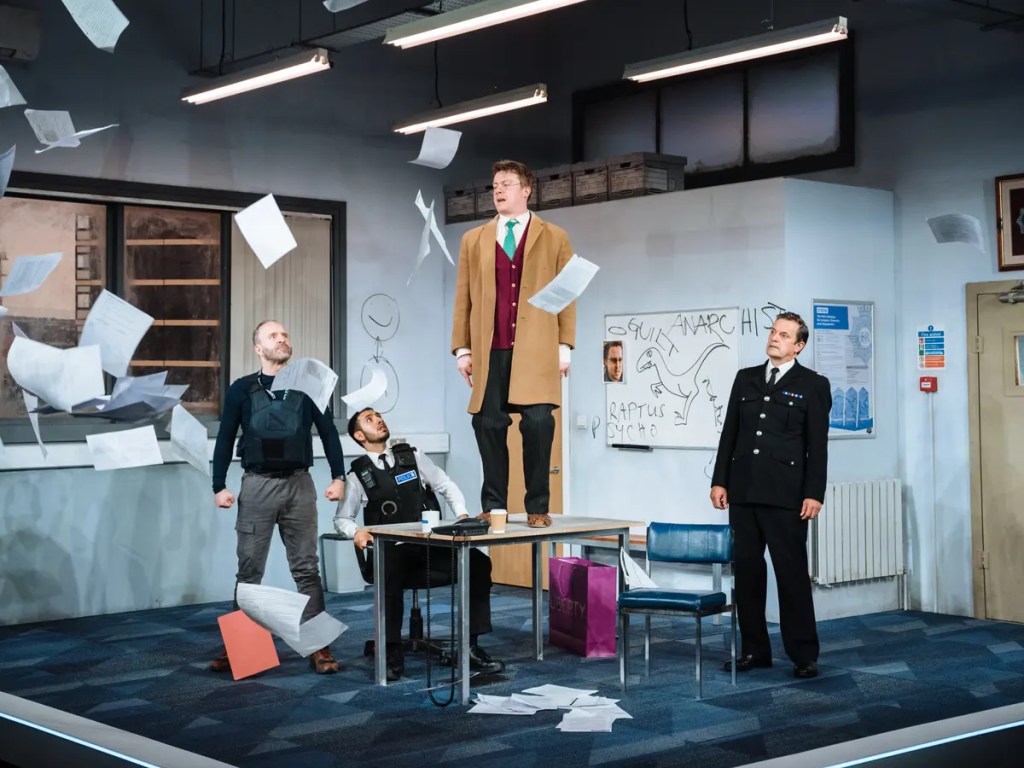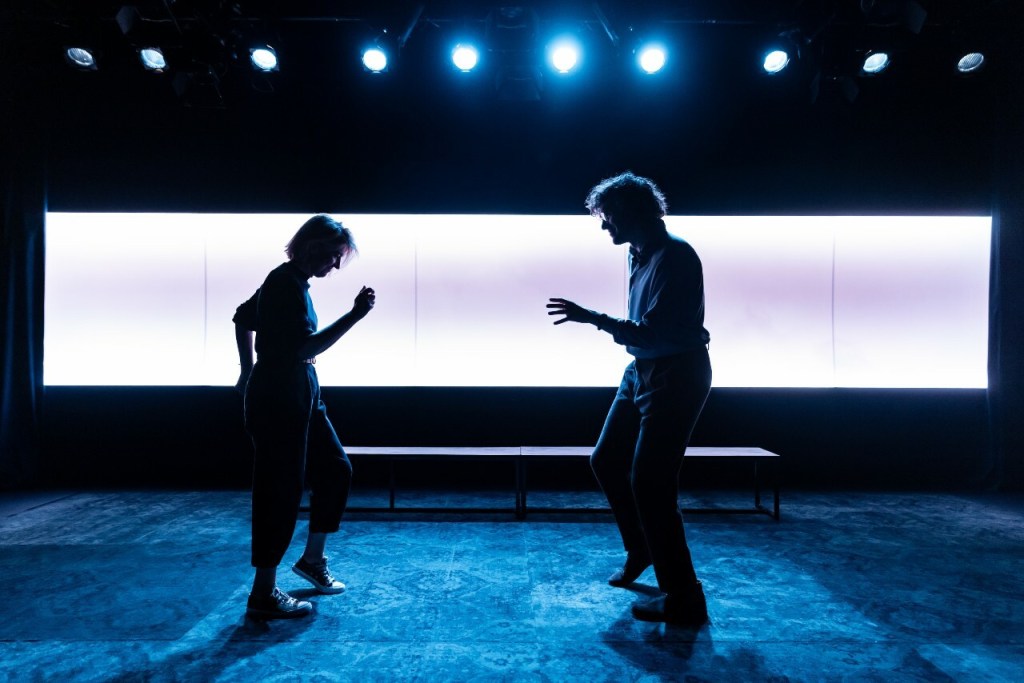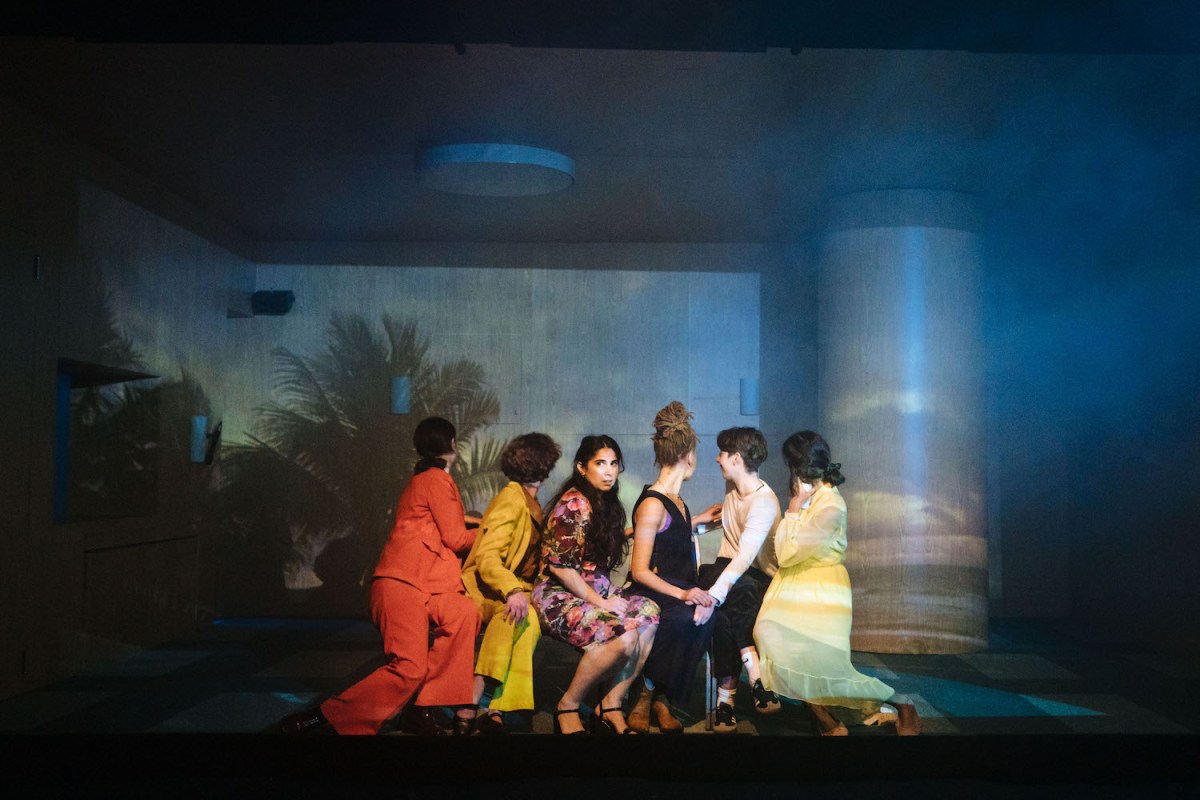Accidental Death of an Anarchist – Sheffield Crucible/Lyric Hammersmith/Theatre Royal Haymarket

Anchored by a relentlessly energetic tour de force from Daniel Rigby as the Maniac, Tom Basden’s retelling of Dario Fo and Frances Rame’s 1970 play scabrously satirised the failings of the Metropolitan Police. Bolstered with rat-a-tat gags and clowning (a particularly funny sequence occurs when the Maniac to pretends to forget how to step off a table), the three-laughs-a-minute comedy takes its audience to one of the most starkly critical plays about the police force. Much of the humour comes from the sheer preposterousness of earnestly defending systemic and individual failings. (One of the most uproarious lines in the first half comes from the Maniac’s pompous paean to the ‘brave men and women of the Metropolitan Police’.) The force and energy is reminiscent of Joe Lycett’s stunt of claiming to be ‘very right wing actually’ on Laura Kuenssberg’s Sunday morning politics show in 2022, By mounting such an enthusiastic defence we know the speaker does not believe, the very idea of defending them is rendered unavoidably satirical.
The show rails against institutional corruption, with the audience quickly enlisted onto the Maniac’s side through direct address and sweet throwing. Yet in the play’s remarkable closing minutes, Basden injects a sharper note, the Maniac shifting from a surrogate for the expected audience’s righteous anger towards indicting them. Noting the likely ‘liberal’ politics of the play’s audience, the Maniac indicts the hollowness of disengaged liberalism under capitalism; changing things for the better might actually cost the audience something. Police violence and corruption is connected to systems of economic and social power from which many (undeservedly) benefit. It is a note of sharper radicalism, smuggled in amongst the sheer entertainment value overall comic farce. Surprising for a play which ended up in the West End, Basden’s adaptation suggests the potential for a revitalised form of political theatre.
Body Show – Pleasance Courtyard/Soho Theatre

A decade ago, Anne Washburn’s Mr Burns: A Post-Electric Play examined how stories (and capitalism) might persist in remade forms after a nuclear apocalypse. This glorious and very formally different show does similar but for gender, exploring in rapid-fire sketches and slower moments of horror how stereotypes and socialised roles are reinforced in the cultural detritus that might survive us – and could, indeed, play a role in taking us to the brink. Body Show shares Mr Burns’s melancholic and humorous orientation towards the end of life as we know it, as well as its anarchic remixing of popular media and cultural iconography.
Through breath-taking lip-synching, dazzling video design and the densest dry ice I’ve encountered in a theatre, Frankie Thompson and Liv Ello’s comedic show explores what our current world looks like from the fragments left over at the end of the world. Through pin-sharp sketches, they devastatingly expose the abstract gender roles are concretised into rigid divides. A poignant scene early on depicts the irrepressible enthusiasm of five-year-olds at a cowboys and ballerinas birthday party, with Thompson playing a young girl unable to quite comprehend that Ello might prefer being a cowboy rather than a ballerina. Even before they find a vocabulary to express it, a restricting grammar of gender has been imposed on their view of the world. The show turns on its head almost effortlessly between a serious, melancholic truth-speaking and utter hilarity. Brilliant riffs on The Great British Bake Off, Twin Peaks, and a mash-up of the petty betrayals of Come Dine With Me with the presence of Judas Iscariot in Da Vinci’s The Last Supper made this one of the most entertaining shows of the year.
The Effect – National Theatre

Jamie Lloyd’s customarily stripped-back staging of Lucy Prebble’s The Effect (2012) was a highlight in a largely strong year for the National Theatre. Frequent collaborator Soutra Gilmour set the action on a stage bare but for two chairs and a bucket, lit with cool LEDs from every side, including a light-up floor. As projections affirmed, Lloyd’s production drew on the idea of the play as an ‘experiment’, a crucible in which to test out ideas and feelings. Paapa Essiedu and Taylor Russell brought a hilarious, earnest passion to the drug-enhanced love story, and smart tweaks to the original 2012 script by Prebble situated the play in a more specific contemporary context, with glancing references to gentrification and racist violence.
Perhaps the greatest addition made to the play though was the dynamism of its movement, aided by the space afforded by the empty stage. Essiedu and Russell vibrated with energy throughout, juxtaposed with Michelle Austin and Kobna Holdbrook-Smith’s postures of attempted detachment as the drug trial’s organisers. Though superbly choreographed, the production adopted a winningly unfixed, semi-improvisational approach. Ad libs – verbal and in motion – abounded (at least between when I watched it and the version released recently on NT at Home). This leant the play a terrific energy, affording subsequent scenes of stillness a richer intimacy. This sublime staging found rich depths of emotion in the play’s later scenes, sometimes in unexpected places. Russell astonishingly captured the cresting waves of love, frustration and heartbreak in the closing section, when Tristram is suffering from transient global amnesia, leading to them having to have the same conversations every day. In their shared struggle, the play suggests, their love is forged as something deeper than fickle chemical feeling. It is a shared commitment, increasing over time, optimistic for the future.
While Prebble’s dialogue edits are largely effective, the play’s fundamental mechanics resist editing. Therefore, the play’s central debate over the efficacy of depression medication feels a little tangential to debates about mental health in the 2020s. (A play like Sophia Chetin-Leuner’s This Might Not Be It, which opened at the Bush in January 2024, offers a perhaps more contemporary angle on mental health treatment – with a focus on barriers to accessing treatment rather than debating effectiveness.) That said, the questions still remain somewhat pertinent as well as dramatically interesting, and for Lloyd, the drug trial does feel more of a timeless dramatic mechanism to raise questions about the origins of our feelings and the extent to which human agency is impaired or underpinned by the role chemicals play in the brain. Prebble and Lloyd are not prescriptive in answering these questions. Instead, as the ending seems to suggest, long-term feelings (such as love) are forged through actions, not just chemicals.
Infinite Life – National Theatre

Annie Baker’s latest play emerged in late 2023, after two of years of limbo following the cancellation of its 2021 run in America. Fittingly, the play is deeply concerned with forms of limbo. Infinite Life’s characters experience various forms of time distortion due to physical pain symptoms – some chronic, some self-inflicted through fasting regimens adopted in the hope of alleviating their other symptoms.
As Thomas Butler recently argued in a monograph on Baker, her plays ‘lead us to recognize the insistent realness of the lives of others’, a reason I would contend her plays (most notably The Flick) have been interpreted with some hostility from previous audiences. We are brought into a confrontation with themes, ideas and realities that carry an inherent ethical charge, making them difficult to dwell on. Infinite Life continues in this vein with its focus on pain. Elaine Scarry notably argues that central to pain is its ‘unsharability’, due to its ‘resistance to language’, and Baker here tries to find a language – dramatic as well as verbal – in which to express it, as her characters suffer in quiet agony on the nondescript sun loungers of a mid-market wellness retreat.
Baker writes in a typically reserved style, though with palpable empathy towards her characters. Her own opinions go largely undetectable in the play’s evocation of the charged world of alternative medicine. Baker is uninterested in mounting a scathing analysis of the virtues and vices of wellness. Instead, her concern remains the people caught in its eddies and the conditions in which such treatments arise. Infinite Life joins The Antipodes in presenting a culture in which the pain of women is held in an irreverent disregard. The women (and one man) on stage are mostly present because nothing else has worked for them, and there is never a conspiratorial undertone in their thinking. Most of them are just willing to try everything.
In a prefatory note to her early play Circle Mirror Transformation (2009), Baker cautions directors that ‘without its pauses, this play is satire’, a rare forthright contribution from Baker explaining her aesthetics. Her perhaps signature pauses are in evidence in James Macdonald’s staging, a vital component in fostering a verisimilitude which invites the audience to treat its characters as people. For Butler, in Baker’s plays, our ‘attention prevents us from reducing other people to symbols or ideas’, a heightened naturalism running contrary to many conventional theatrical dramaturgies steeped in symbolic plots, characters and objects. Baker’s is an ethical theatre which palliates against the irresolvable while challenging the empathetic sensibilities of an audience – and, perhaps, changing them.
Octopolis – Hampstead Theatre

Marek Horn returned to ocean depths again (after 2021’s superb Yellowfin) in this searching, romantic and ultra-dense play of ideas. Having edited it down from a draft of 30,000 words, Horn himself describes the play as ‘theatrical uranium’, yet the resultant richness is never contrived or needlessly difficult. Horn’s dazzling conjectures emerge neatly from cogent intellectual riffs from his two characters: academics driven by a rigorous, truth-seeking curiosity about the world. Through a largely unexplained dramaturgical device, we are addressed by the characters through a form of narration, enlisting us a third party to weigh their ideas for ourselves. The effect is an unusual yet compelling blend of alienation and invitation; we are made conscious to some extent of the performance, but also of the fact this performance is being put on (by the characters) for us.
Ed Madden’s adept direction accepts this dramaturgical gauntlet by brilliantly situating the play within a strangely intuitive no-place, with many actions going unembodied. Sometimes, actions curiously juxtapose the words. In Madden’s blocking, for example, Harry obstructs George’s view of Homes Under the Hammer by standing behind her, subtly calling our attention to the constructed-ness of events – two sides of an argument performed by the characters.
Ever-present is the octopus, Frances, on whom the characters’ contrasting research is centred. Anisha Fields’ compelling design incorporates an abstract octopus tank, which swirls with dry-ice, generating an octopus-like evanescence, gorgeously lit by Jamie Platt. Philosopher of science Peter Godfrey-Smith sees octopuses as a potential site of alien contact – the most genetically distant intelligence life of which humans are aware. Thus, for Horn, the sea creatures make an ideal springboard for questions about the nature of consciousness and being – approached here from three angles between the two characters: biology, anthropology and religion.
Like Yellowfin before it, this is a veiled climate crisis play, and it similarly stages characters hell bent on finding (or at least attempting to believe in the existence of) knowledge which would reconfigure human nature into something more benign. Harry’s potential discovery of an octopus soul, evidenced (he thinks) through observation of prayer rituals, is proffered as a hope of recalibrating human’s relationship to the natural world – upsetting the very binary of nature and culture. Like in Yellowfin, the hope seems laced with futility, born of a desperation at human’s destructive tendencies rather than anything more empirical. Nevertheless, it feels like a rich seam for Horn to return to again.
Paradise Now! – Bush Theatre

From Jaz Woodcock-Stewart’s production of Paradise Now! by Margaret Perry, small moments linger in the memory. Realising the financial ruin of her and her sister, a character ruefully, slowly, takes a bath, wryly pouring in some of the essential oils that have sealed their fate. Another character makes a sudden disclosure of deep personal pain, but despite being part of a community aiming to empower each other, her appeal goes unanswered. Elsewhere, the characters go bowling, and one of them scores a strike. Throughout, scene changes burst into life with unexpected group choreography. The result is a haunting and empathic tragedy about the value and limits of community and solidarity, unafraid to linger on moments that fill your soul with joy, only to break your heart.
Rosie Elnile’s glorious set houses a world of everyday triumph and disaster. Deeply humane, this brilliantly told tale of women entering the vortex of a pyramid scheme selling essential oils cracks open how languages of trauma and female empowerment can be captured by corporate interests. Central to this is the oxymoronic figuration of the scheme a space of mutual female support, while its fundamental financial logic demands competitive opposition, winners and losers. Woodcock-Stewart, one of the finest directors working in Britain at the moment, skilfully facilitates the coexistence of both the earnest joy of this community and the play’s sharp critique. There is space for laughter amongst grief, and every character compels sympathy, yet the pernicious dangers of the ‘Paradise’ organisation’s business model never slide from view.
Talking About the Fire – Royal Court

Chris Thorpe and director Claire O’Reilly’s show about the horror of nuclear weapons finds profundity through lo-fi stylings. Thorpe amiably invites audiences into the space, asking our names, getting to know us a bit, and trying to get us to know each other too. He spends some of the show at a desk on a rug (which he tells us he does not like). There is little regard for aesthetics of slickness. Thorpe is interested in frankness above all.
Thorpe manages audience interaction fantastically here, and I would argue that discomfort is thoughtfully and sensitively built into the show’s dramaturgy in several ways. The content of the show is unavoidably alarming, and Thorpe gradually makes us imagine nuclear weapons as something closer and closer to home – pointing out the direction of nuclear weapons stored under one hundred miles away, and modelling the blast radius of a nuclear strike on the Royal Court Theatre. Thinking about the existence of nuclear weapons so directly is inevitably disconcerting, but Thorpe memorably reminds us – half-grim, half-reassuring – that the chance of a nuclear strike is exactly the same as it was before we started thinking about it. For Thorpe, something as sweeping as a ‘solution’ seems unfeasible, echoing his previous writing on the climate crisis as well as his apocalyptic kitchen-sink fusion piece Victory Condition (2017). Denuclearisation is presented as a distant goal which requires diplomacy and sustained conversation. Therefore, the show itself is structured as a form of conversation; Thorpe solicits our ideas, quizzing us on facts about nuclear weapons, passing out biscuits, and asking people (including me) to choose a song to play on Spotify, describe our typical morning routine, or diagnose London’s greatest socio-economic problems.
In the moment of audience participation, Thorpe’s show achieves something alchemical – something that seems intensely (perhaps uniquely) theatrical – despite the The Guardian’s one-star review calling it ‘scrappy and untheatrical’. Audience interaction for most people, I would suggest, is awkward and difficult, and though attendees of previous Thorpe shows might not be surprised, Talking About the Fire is not overtly advertised as participatory (beyond the implications of its title). Choosing a song to play for a room of 80 strangers is inherently daunting, not only asking you to speak in a public forum but place something as potentially delicate as your personal taste under the scrutiny of others. How individuals respond to such a request will hinge on many variables, but this potentially (probably likely) discomforting experience seems like a core part of the show. Because you venture an answer – you choose a song (in my case, Heaven by Mitski) – and it’s fine. A metaphorical ball has been thrown to you, and you’ve returned it successfully, and now you are enmeshed in the show in a new way. This functions as something more than a metaphor; it models what Thorpe hopes will come out of the show: further conversation. The leap of suggesting a song is, the dramaturgy implies, a similar leap to that of broaching the subject of nuclear weapons with families over Christmas dinner (after all, the Royal Court run was on in December), or with people less familiar to you. Thorpe’s play is a rare theatrical experience. Those already in the know on nuclear weapons policy may derive relatively little new from its facts, but its power lies in its unusual and moving engagement with audiences.
